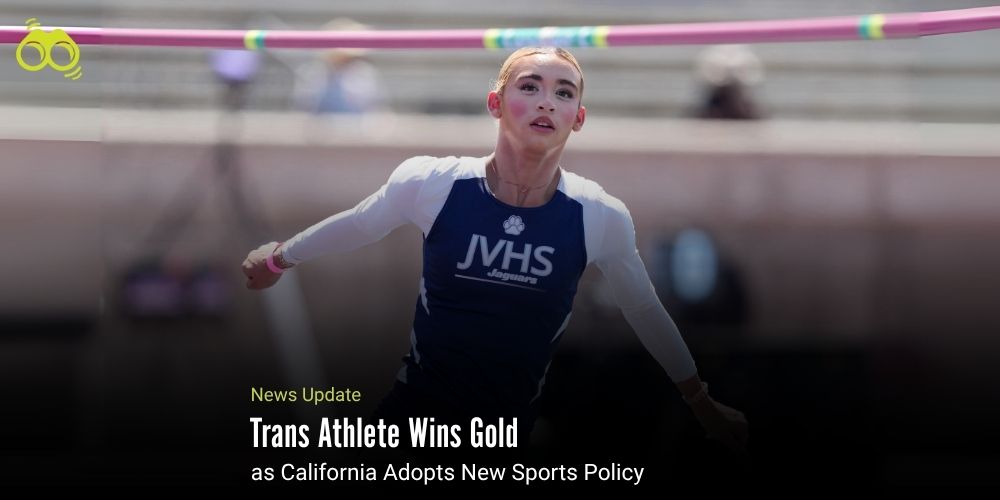California Interscholastic Federation’s Policy Change Raises National Discussion
Transgender Athlete Secures Gold, Sparks Debate Over Sports Regulations
The ongoing debate surrounding gender identity and competitive sports has once again come into focus following a recent development at the California High School Track and Field Championship in Clovis, California. A transgender athlete secured gold in both the girls’ high jump and triple jump, an achievement that attracted national attention and sparked controversy. This issue has raised discussions on inclusivity, fairness, and sports regulations, as policies continue to evolve to accommodate diverse participation while maintaining competitive integrity.
This outcome followed a new policy introduced by the California Interscholastic Federation (CIF), the state's high school sports governing body. Regarded as one of the first policies of its kind in the country, the rule aimed to broaden participation and ensure competitive opportunities for more athletes. CIF stated that the change was designed to allow all students to feel included, enabling them to compete and connect while adhering to California law.
CIF reportedly implemented the policy earlier in the week, in response to Hernandez’s strong performances before the championship. The rule allowed an additional student to participate and be eligible for medals in events where Hernandez qualified. In the high jump, Hernandez cleared 5 feet, 7 inches (1.7 meters) without a single failed attempt, while co-winners Jillene Wetteland and Lelani Laruelle achieved the same height but with one failed attempt each. The three athletes stood together on the podium, smiling as they shared first place.
In the triple jump, Hernandez finished first, sharing the top spot with Kira Gant Hatcher, who trailed by just over half a meter. Earlier in the day, Hernandez placed second in the long jump, narrowly missing out on victory. Observers noted that previous state long jump records had been set by Olympians Marion Jones (1993) and Tara Davis-Woodhall (2017), both surpassing 22 feet (6.7 meters). This year’s winner, Loren Webster, reportedly achieved just over 21 feet (6.40 meters), finishing slightly ahead of Hernandez.
The two-day championship, which began on 30 May at a high school near Fresno, took place under sweltering conditions, with Saturday’s finals held amid triple-digit temperatures. Despite the controversy surrounding Hernandez’s participation, the event itself remained largely calm. However, critics, including parents, conservative activists, and former President Donald Trump, voiced opposition. Some attendees wore pink bracelets and T-shirts with slogans such as “Save Girls’ Sports.” During the qualifying rounds, a plane flew over the stadium for over an hour, displaying a banner that read “No Boys in Girls’ Sports!” The Independent Council on Women’s Sports and Women Are Real, two organisations opposing transgender participation in women’s sports, later claimed responsibility for the display.
A recent AP-NORC poll found that approximately 70% of U.S. adults opposed transgender female athletes competing in girls’ and women’s sports at the high school, college, and professional levels. This view was reportedly shared by 90% of Republicans and around half of Democrats. Although CIF’s policy change closely followed Trump’s threat to withdraw federal funding from California unless transgender athletes were banned from girls’ sports, CIF officials clarified that their decision had been made before the former president’s remarks. This event has reignited discussions on the balance between inclusivity and competitive fairness in sports, highlighting the complexities of evolving athletic policies.
Editor’s Note:
The recent California high school championship serves as a vivid example of how sports organisations are striving to broaden access for all athletes while still maintaining the core principles of fair competition. As governing bodies introduce new rules and policies, they face the dual responsibility of honouring the rights of transgender athletes while also addressing broader concerns about competitive equity. These issues are not easily resolved and require thoughtful, nuanced consideration. While inclusivity remains a cornerstone of modern sports values, the importance of ensuring fair and balanced competition cannot be overlooked. Any revisions to existing frameworks must be approached with care, drawing on a range of viewpoints, ethical considerations, and scientific research.
Skoobuzz firmly believes that striking the right balance between inclusion and fairness is essential to shaping a future for sports that is both just and respectful to all participants.














0 Comments (Please Login To Continue)